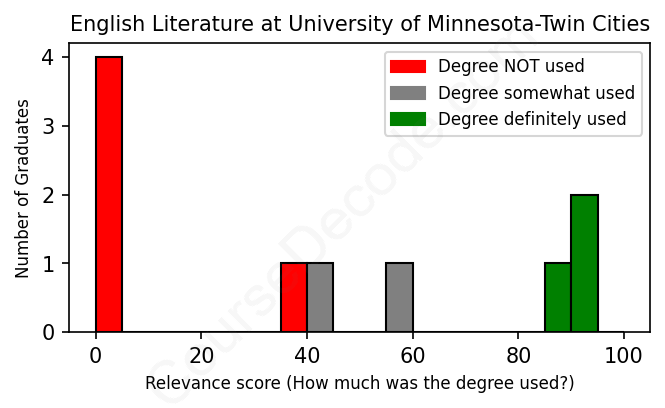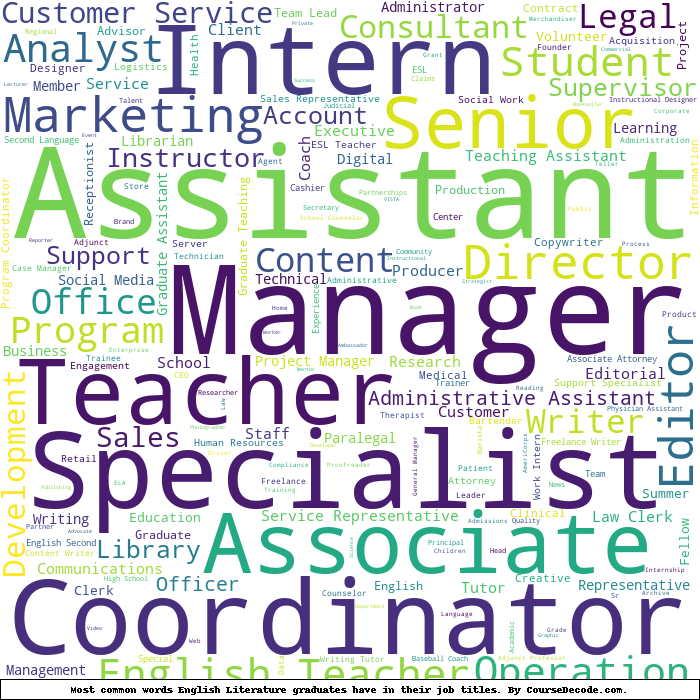
First, some facts. Of the English Literature graduates from University of Minnesota-Twin Cities we've analyzed , here's how many have used (or NOT used) their degree in their career:

These are estimates based on AI analysis of 10 LinkedIn profiles (see below).
The verdict? Bad. Overall, with an average relevance score of 41%, English Literature graduates from University of Minnesota-Twin Cities have a substantially lower likelihood (-26%) of finding work in this field compared to the average graduate across all fields:
And for comparison, here's the chart for all profiles we've looked at across all degrees.
Also, after graduating, only 30% of these graduates have pursued further education other than another Bachelor's degree (such as a Masters degree or other), compared to the average across all profiles of 35%. This suggests a Bachelors degree is enough for most English Literature graduates, and it's normal to look for work straight after graduation.
See the details:
|
Relevance score: 0% We think this person has NOT gone into a career related to their degree. We think this person has NOT gone into a career related to their degree.
DEGREE INFOGraduated in 2018 from University of Minnesota-Twin Cities with a Bachelor of Arts - BA in English Literature. No other secondary education since. JOB HISTORY SINCE GRADUATIONElection Services Merrill Corporation Jul 2018 - Oct 2018 ABOUTRecognized writer and editor. No stranger to positions of leadership and collaboration. First-rate communication abilities. Musician, and driven worker. 90 WPM. |
The top 10 most common jobs done by the graduates we've analyzed (ranked most common to least) are:
People who studied English Literature at the University of Minnesota-Twin Cities seem to have landed in a pretty wide range of jobs after graduation. The most common types of roles include positions in content creation, teaching, and some corporate environments, mostly in areas like data analysis and management. While it's clear that some of these jobs, especially those tied to writing such as copy editing or staffing for journals, directly relate to the core skills of their degree, many others don’t utilize that literary background at all. A bunch of them took on roles like accountants, administrative assistants, or customer service positions, which aren’t really about literature or critical analysis.
In general, the relevance of their jobs to English Literature varies a lot. Roles like the Student Teacher or Staff Writer tap deeply into those literary skills—analyzing texts, understanding themes, and communicating effectively in writing. However, many graduates found themselves in jobs that, while they might require some communication skills, don’t do much to engage the literary knowledge they gained from their studies. So, while some folks are definitely using their degrees, a significant number seem to be working in areas that feel pretty far removed from the world of English Literature. It’s a mixed bag, for sure!
Here is a visual representation of the most common words in job titles for English Literature graduates (this is across all English Literature graduates we've analyzed, not just those who went to University of Minnesota-Twin Cities):

It looks like graduates from the University of Minnesota-Twin Cities with a degree in English Literature have taken a pretty diverse route when it comes to their careers. For a lot of them, their first jobs after graduation are often internships or entry-level positions that are somehow related to writing, education, or corporate roles—like working as a corporate development intern, a staff writer, or even a student teacher. These roles suggest that recent grads are tapping into their writing and communication skills right away, which is a solid start considering those are key strengths developed during their studies.
However, as we look at their career trajectories over the years, there's a noticeable mix. Some graduates stay in roles that directly relate to writing, education, or community services, while others drift into areas like corporate data analysis, administrative roles, or seemingly random job positions that don’t leverage their literature background. For example, several alumni end up in different companies or fields, where the connection to English Literature isn't clear—think roles like property accountant or accounts payable assistant. So, while some find fulfilling careers relevant to their degree, others might be in jobs that are less connected to their passion for literature, indicating a potential need to adapt or pivot their career goals along the way. Overall, it’s a mixed bag of outcomes, and that’s pretty common for liberal arts majors starting out in the job market.
Getting a Bachelor’s degree in English Literature at the University of Minnesota-Twin Cities can be a pretty engaging experience, but it also comes with its fair share of challenges. The program dives deep into a wide range of texts, theories, and historical contexts, so if you’re not a big reader or enjoy diving into complex themes, it might be tougher for you. While some students find the discussions and writing assignments to be super enjoyable, others might struggle with the workload, especially when it comes to analyzing poems or writing essays. Overall, it’s not necessarily harder or easier than average; it really depends on how much you enjoy literature and how comfortable you are with writing and critical thinking. If you love storytelling and have a passion for reading, you might find it more rewarding than difficult!
Most commonly, in the LinkedIn profiles we've looked at, it takes people 3 years to finish a Bachelor degree in English Literature.
Looking at the job history of these English Lit grads from the University of Minnesota-Twin Cities, it seems like a mixed bag when it comes to making decent money. The first grad took a lot of internships before landing some solid roles at Target, which likely pays pretty well, especially as they moved into senior analyst and auditor positions. The second grad looks like they stuck with teaching, which can be rewarding but typically isn't the highest-paying job. Others seem to be bouncing around in various roles, like administrative positions and sales, which usually don’t offer the best salaries either. So, while some have carved out a lucrative path, especially at Target, others might not be raking it in as much. It all boils down to the specific career choices and industries they’ve ended up in!
Here is a visual representation of the most common words seen in the "about" section of LinkedIn profiles who have a Bachelor degree in English Literature (this is across all English Literature graduates we've analyzed, not just those who went to University of Minnesota-Twin Cities). This may or may not be useful:

Here are all colleges offering a Bachelor degree in English Literature (ordered by the average relevance score of their English Literature graduates, best to worst) where we have analyzed at least 10 of their graduates: